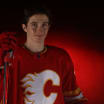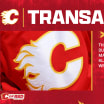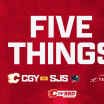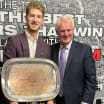The arrival he recalls vividly above all else.
The sight of that beautifully bright, prairie-blue sky blanketing the checkered, Alberta countryside was, quite simply, "stunning."
For the first time as a local on the NHL circuit, Peters landed in YYC with but a simple impression.
"It felt right," says Peters.
"I never made it a goal of mine and said that I absolutely had to coach in Canada, but when the opportunity presented itself, I was very happy."
Q&A WITH BILL PETERS
Flames coach talks about growing up in rural Alberta, when his passion for teaching the game started, the NHL coaching fraternity, and the challenges of taking the reins of a new team
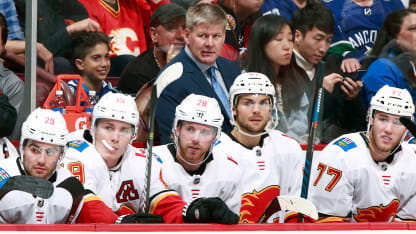
Indeed, the comforts of home are impossible to replicate, as Peters would attest.
In more ways than one.
"I'm proud of where I'm from. It's not only the place I grew up and call home, but it's the place where my career began - where I began the learning the ins and outs of the game that has been so good to me."
CalgaryFlames.com's Ryan Dittrick sat down with our head coach to discuss his upbringing, the move home, the mentors that have shaped him, and his early impressions of his new team.
DITTRICK:Well, Bill, we're a few games into the new season and a few months into your move back to Alberta. How are things going for you and your family?
PETERS: It's been busy, but I'm very happy with everything so far. Just trying to get the house settled and get my son into school - he's busy travelling lots, playing hockey - and then obviously our quick trip to China... It's been a long list of things we've had to check off. Things are beginning to settle down now, though.
DITTRICK: So it's been a good fit so far?
PETERS: Real, real good. My son is very happy at the school he's at and the team he's on. A former Flame, Jeff Shantz, is coaching him out at The Edge School. So that's going really well, and now it's going to start to slow down a little bit, but the next thing you know, you've got the holidays coming up.
DITTRICK: What was it like growing up in rural Alberta and being a part of those teams with that fervent, small-town passion we all hear about?
PETERS: (Laughs) It was excellent. I grew up in two small towns, really. Born in Three Hills and raised in Killam, and I wouldn't trade it for anything. You get to learn small-town values, you get to know everyone, and whatever sport is in season, that's the sport you play. Not only did I play hockey growing up, but I played a lot of baseball in the summertime, too. It was big back then. Everyone played. You never got cut, because they needed everyone to field a team. I ended up forming some real good friendships, some lifelong relationships, and I've carried that with me growing up and all through my professional life.
DITTRICK: Fair to say the farm living toughened you up a little bit?
PETERS: Oh yeah. It's definitely a little different growing up on a farm. It's blue collar, but it's a great way to grow up and a great way to live if you're fortunate enough to be able to do it. My family, the way they raised me, are a huge part of who I am today. My father and grandfather, two of the hardest-working guys I've ever met, taught me the value of that work ethic and what it takes to be successful.
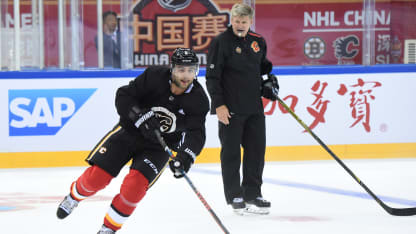
DITTRICK:You were obviously heavily involved in the game growing up as a player, but when did you begin to take an interest in coaching?
PETERS: Probably when I realized I wasn't good enough to play professionally (laughs). I had a little bit of an injury, too, but I just loved the game and didn't want to let go, as most future coaches do. I was lucky enough to have played under some real great coaches in my career, and especially in college. It was probably around then when I truly caught the bug. I was about 21, 22 years old at the time and was developing under some real passionate minds. I wasn't sure if I'd be able to make a career out of playing, but if I could have a hand in developing other players in that capacity, impart some of what I'd learned under those great leaders I had, it was something I thought would be a great thing for me and my career. I was only 24 when I got my first coaching gig in Killam. It was a great experience for me, and something I look back on as being the real springboard for my career.
DITTRICK:Was there anyone in particular, especially at that age, that was a mentor to you?
PETERS:I played for Mike Johnson at was called Camrose Lutheran College at the time, but is now called Augustana University. I played there for two years, and then played at Red Deer College under Mike Babcock, so those were both real good learning opportunities for me, both as a player and an eventual coach in the National Hockey League. Babs is definitely a mentor, and a close friend. There were others, too, that were real good coaches in the ACAC that I looked up to - Perry Pearn, for example, was coaching at NAIT. That was also at a time when Hockey Canada was doing a great job with coaching development, so I got heavily involved in that, and surrounding myself with who I felt were the best minds in the game. I think the best thing any young coach can do is keep your ear close to the ground and absorb all the information that's available to you. There's a lot, and it might seem overwhelming, at times, but these are the pros and they know what they're doing. That was my mindset.
DITTRICK:If someone were to ask you, straight up, 'What kind of coach are you?' What would you say?
PETERS: I would say that I'm an honest guy above all else. I'm going to tell you the way it is, but I'm also very supportive. At the end of the day, you're trying to make players, not break players, so you're trying to set them up to be successful. For us here with the Flames, it's all about our team game and our team identity, our culture, in order to have success on a consistent basis.
DITTRICK: Are there any current or former NHL coaches - like Babcock, for example - that you look up to as role models?
PETERS: Yes and no. Yes, that you want to bring some elements of those you learned from, and no, because you want to develop your own style. I think I've done a little bit of both throughout my career. When you've been around long enough, you start to build relationships with all the coaches in the league, and further build on the ones with the guys that I've worked with in the past at World Championships, or the World Cup, and other international events, especially. It's definitely a small fraternity, and we're 31 guys that are lucky to have the positions that we do.
DITTRICK:With that in mind, do you stay in touch and have a special relationship with the some of the guys on the previous staffs you've worked on?
PETERS: Definitely. We talk with each other quite frequently, mostly about things that are coming up in the league, like rule changes, if and when those happen, and how they might affect the game. (Barry Trotz) is a guy I have a good relationship with, and a guy I coached against for a couple years in the Metropolitan Division. He's still in the Metro, now with a new team - the Islanders - but he's a guy I can lean on for anything out east, and he knows he can do the same about anything in the Pacific.
DITTRICK: You've coached on a few teams now at this level. What's it been like getting to know a brand new group of guys, each one with a different personality that you surely want to tap into?
PETERS: It's a challenge, for sure, but that's the essence of coaching. You're always meeting new players and learning how you can connect with them on a personal level as quickly as possible. You can't force it; you've got to get into some battles and be a part of some different experiences with one another. That's when you truly learn about each other's tendencies and what makes them tick. So far, it's been good. I'm looking forward to working with this group. I think it's a team that has huge upside, and they're a group that truly cares. They care about the work they put on the ice and they care about each other. As a coach, you can't ask for anything more than that.

